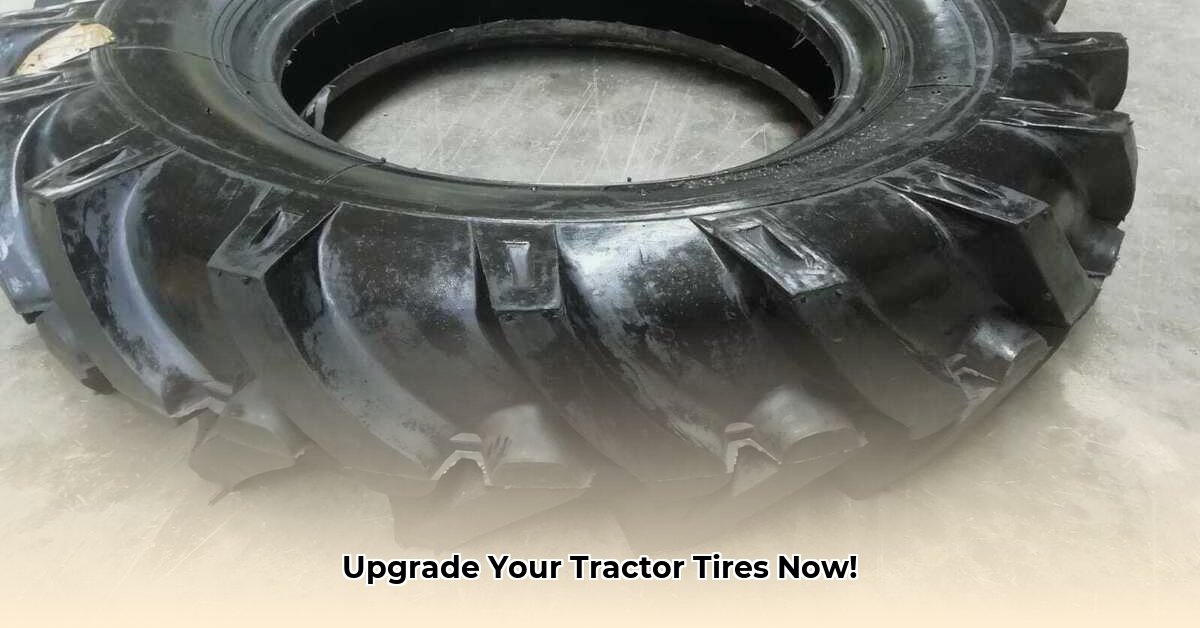
Finding the right 6-14 tractor tires can be challenging due to limited readily available performance data. This guide empowers you to make an informed decision by focusing on understanding tire specifications, assessing your needs, and exploring available options. For larger tractors, consider exploring options like 11-00-16 tires.
Understanding 6-14 Tire Specifications
The "6-14" designation indicates a 6-inch wide tire mounted on a 14-inch diameter rim. However, several key specifications impact performance and longevity:
Ply Rating: This number represents the tire's strength and durability. A higher ply rating (e.g., 4-ply vs. 6-ply) means more layers of rubber, leading to increased load capacity and resistance to punctures. Think of it like the layers of fabric in a sturdy jacket – more layers equals more strength.
Load Index: This indicates the maximum weight the tire can safely carry at its recommended inflation pressure. Exceeding the load index significantly increases the risk of tire failure. Always check your tractor's owner's manual for the appropriate load capacity. Your tractor's load-bearing capacity will restrict which 6-14 tire you can use.
(Diagram of a 6-14 tire showing ply rating and load index would be placed here.)
Identifying Your Needs: Matching Tires to Your Work
Before exploring brands and models, assess your specific needs:
Soil Type: Do you primarily work on hard-packed clay, sandy loam, or muddy fields? Aggressive tread patterns with deep lugs provide superior traction in soft soil, while smoother treads are better suited for hard surfaces. A tractor used primarily on paved areas will need far different tires than one used in a muddy field. What is your soil like?
Workload: What are your typical tasks? Heavy hauling requires tires with a higher ply rating and load index to prevent damage and ensure safety. Light tillage demands less robust tires. Consider the typical loads your tractor handles.
Budget: Tire prices vary based on brand, ply rating, and construction type (radial vs. bias-ply). Radial tires generally offer superior longevity and performance but come at a higher initial cost. Bias-ply tires represent a more budget-friendly option, but they may require more frequent replacements. What is your budget for this purchase?
Available Brands and Models: Navigating the Data Gap
Detailed performance comparisons are difficult due to limited publicly available data. Nonetheless, several reputable brands offer 6-14 tractor tires, including BKT, Carlisle, and Titan. When reviewing online product descriptions, pay close attention to:
Tread Pattern: Look for descriptions highlighting features like "aggressive tread" (for superior grip in soft soil) or "smooth tread" (for better performance on paved surfaces).
Construction: Note whether the tire is radial or bias-ply. Radial tires generally provide better fuel economy, longer life, and smoother ride. Consider the balance between initial cost and long-term value.
(Table comparing brands and features, mentioning limitations of data, would be placed here)
Where to Buy: Online vs. Local Agricultural Supply Stores
Each option offers advantages and disadvantages:
Online Retailers:
- Pros: Wide selection, price comparison, convenience.
- Cons: Shipping costs, limited personalized advice, potential difficulty resolving issues.
Local Agricultural Supply Stores:
- Pros: Expert advice, potential for installation services, quick problem resolution.
- Cons: Higher prices, potentially smaller selection.
Choosing between online and local suppliers depends on your priorities and resources.
Installation and Maintenance: Ensuring Tire Longevity
Proper tire installation is crucial for performance and safety. Consider professional installation if you lack experience. Always consult your tractor owner's manual for specific instructions and recommended inflation pressures. Regular inspection for cuts, bulges, and embedded debris is essential for early problem detection.
Finding Additional Information: Expanding Your Research
To deepen your understanding and get more detailed expert opinions:
- Consult Online Forums: Search for agricultural forums and online tractor communities to gather user reviews and experiences.
- Contact Tire Manufacturers: Reach out directly to manufacturers for specific tire performance data or clarification on technical specifications.
- Seek Advice from Local Professionals: Your local agricultural extension service or experienced mechanics can provide valuable insights.
By combining information from various sources, you’ll be better equipped to choose the best 6-14 tractor tires to meet your specific requirements.